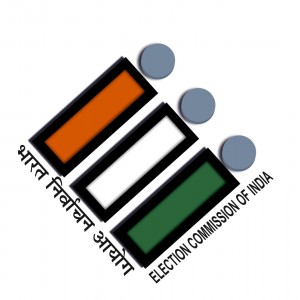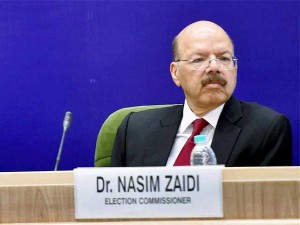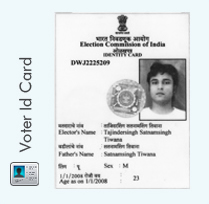India has a constitutional form of democracy with a parliamentary system of government, and at the heart of the system, it has a commitment to hold regular, free and fair elections. These elections, conducted by the Election Commission of India determine the composition of the ruling government, the members of the two houses of the parliament, the state and union territory legislative assemblies, and the President and the vice-president.
The democratic system in India is based on the principle of universal adult suffrage and any citizen over the age of 18 can vote in an election. The right to vote is considered to be irrespective of caste, creed, the religion or the gender of the citizen. Those who are deemed unsound of mind, and those people convicted of criminal offences are not allowed to vote.
Recommended Read: Can Criminals Vote in India?
The Election Commission of India
In order to ensure free and fair elections, the Constitution established the Election Commission of India. In 1950, the Election Commission of India was established in India.

The Election Commission of India is a autonomous body in character, insulated from political pressures and executive influence. Care is always taken to ensure that the Election Commission of India works as an independent body free of external pressures from the party in power. It is the duty of the Election Commission of India to carry free and fair elections to the various legislative bodies and guarantee the growth of the democracy. To supervise, organize and conduct the elections, the Election Commission of India is set up on an all India Level.
The Election Commission of India has constitutional status. The superintendence, direction and control of elections are to be vested in the Election Commission of India. It deals with the preparation of electoral rolls and the conduction all elections of Parliament and State Legislature.
The Election Commission of India consists of the following:
- Chief Election Commission
- Other Election Commissioners as fixed by the President from time to time.
- There shall also be a Regional Election Commissioner.
Recommended Read: How many Election Commissioners can be appointed in India?
The current Chief Election Commissioner is Mr.S. Nasim Zaidi.

The President or Governor on request of the Election Commission of India or the Regional Election Commissioner shall make available staff to discharge the functions of the Election Commission of India effectively.
The Election Commissioner or the Regional Election Commissioner shall not be removed, except on the recommendation of the Chief Election Commissioner.
Their tenure of service, and the other conditions shall be decided by the President.
Elections are conducted by the Election Commission of India
Elections for the Lok Sabha and all the State Legislative Assemblies take place every five years, unless they are called earlier. The President can dissolve the Lok Sabha and call a general election before the five years is up, only if the government can no longer command the confidence of the Lok Sabha, and if there is no other alternative government available to take over the current government.
Holding of the regular elections can only be stopped by means of a constitutional amendment and in consultation with the Election Commission of India, and it is recognised that interruptions of the regular elections are acceptable only in extraordinary circumstances.
Functions of the Election Commission of India
The Election Commission performs the following functions:
- The superintendence, the direction and the control of the elections.
- To conduct the elections of various bodies.
- To give advice to current President or Governor of a State for disqualification of a member.
- To pass any order with respect to the conduct of the elections when there is no law or rule made under the law.
Recommended Read: Major Steps taken by the Election Commission of India
Role of the Election Commission of India
-
The conduction of Free and Fair Elections
One of the important features of the democracy is elections at regular intervals. Democracy is known as the“Government of the people, By the people, And for the people”. The Election Commission of India helps in holding periodic free and fair elections are essentials of a democratic system. It is a part of the basic structure of the Constitution.
-
The Model Code of Conduct set by the Election Commission of India
The Election Commission of India is considered to be the guardian of free and fair elections. In every election in India, The Election Commission of India issues a Model code of Conduct for political parties and candidates to conduct the elections in a free and fair manner.
-
Registration of Political Parties
The party system is an essential feature of the Parliamentary democracy. It helps to avoid confusion and headache of the administration and the confusion of the electorate. It also ensures that the political parties can practice democracy by their registration only with the Election Commission of India.
-
Limits on Poll Expenses
To get rid of the vulgar and extensive show of money during the elections, the Election Commission of India has made many suggestions in this regard. The Election Commission of India has also fixed the legal limits on the amount of money which a candidate can spend during election campaigns. The limits are continuously revised from time to time. The Election Commission of India is also appointing observers to keep an eye on the individual account of expenditure in elections. The candidates are also required to give details of expenditure with 30 days of declaration of results.
-
Use of Scientific and Technological Advancements
- The Election Commission of India is trying to bring improvements in the election procedures by taking advantage of the Scientific and Technological Advancements.
- The introduction of EVM – Electronic Voting Machines is one of the steps in that direction.
To know more about use of EVM’s with candidate photos in the elections in 2015, click on this link.
- The EVM’s are used with the view to reduce malpractices and also improve the efficiency.
- The Election Commission of India is making use of Information Technology and launched a web site of its own on 28TH February, 1998, which can be accessed by clicking on this link. It helps to provide accurate information, management, administration and instant results of the elections.
- To prevent electoral fraud, in 1993 EPICs – Electorals Photo Identity Cards, also known as voter ID cards, were issued. In, 2004 elections it was mandatory to possess card. To know how to apply for an EPIC or voter ID card, click on this link.

-
Checking Criminalization of Politics
The candidates are obliged to submit an affidavit in the prescribed form declaring their criminal record, including convictions and acquittals charge pending cases. This is checked by the Election Commission of India. The information furnished by the candidates shall be released to the public, the print and the electronic media.
-
Right to Know About Candidates
In order to make the democracy healthy and unpolluted, the citizens have right to know about the Candidates to whom they prefer as their Representative. To stop criminalization and in the public interest, the past of candidate is not kept in the dark and thoroughly checked by the Election Commission of India.
-
Role of Advisor
- The Election Commission has acted in the role of advisor recently when the Election Commission of India issued notice to Mr. Varun Gandhi and the Bhartiya Janata Party for the violation of the Model code of Conduct in an offensive speech on 7th and 8th March 2009 at Pilbhit District in Uttar Pradesh.
- Also, the role of the Election Commission of India is advising the President on the question of disqualification if a member of Parliament or advising the Governor on the question of disqualification of a member of State legislature.
-
Prohibition on Publication
The Election Commission of India has issued an order for prohibition of publication and releasing of results of opinion polls (Exit Polls), which may bias the elections.
-
Voter Education
Voters’ Participation in the democratic process is important to the successful running of a democracy and the basis of a wholesome democratic election. Recognising this, Election Commission of India formally adopted Voter Education and Electoral participation as an part of its election management.
-
Demarcation of Constituencies
To move along the process of elections, a country has to be divided into several constituencies, which is usually the work of the Election Commission of India.
-
Electoral Rolls
Another function of the Election Commission is to prepare for identification of the up-to-date list of all the persons who are entitled for voting during the election polls.
-
Scrutiny of the Nomination Papers
The Election Commission of India examines the nomination papers of the election candidates. These papers are accepted if found to be in order, but are rejected otherwise. This duty is performed by the Returning Officer who notifies all the contesting candidates regarding the date, time and place for the formal scrutiny of the nomination papers.
-
Conduct of the Elections
The Election Commission of India undertakes the task of the election poll throughout India. In a Parliamentary constituency, the Returning Officer has to make suitable arrangements for conducting the election poll with the prior approval of the Election Commission of India. The Election Commission of India can order a election re-poll for the whole constituency under circumstance compulsion.
The Election Commission of India over the years has conducted number of well known and important electoral reforms to strengthen democracy and enhance fairness of elections. The Election Commission of India has taken the best steps possible to stop malpractices during elections by using advanced technology. All these efforts taken by the Election Commission of India will hopefully help grow democracy in the minds of the people. The Election Commission of India examines the issues of the elections and always emphasizes on protecting the fundamentals of democracy.
Why & what for the Enrollments? The Staffs of all the Electoral areas are helpful to those interested for enrolling,changing their area & address etc? I had a bitter experience for the last 2 years or more , applied with 2 different Forms with all the required documents in B’lore One Center at Bangalore Banashankari 2nd stage BDA complex . And after lots of follow up disgusted and stopped further more for my entire family of 5 . And now old EPIC also lost but Xerox copy with us. . Buttering to different tablele in different staffs & their verdicts not healthy to me.Hence, decided long back no vote no Id for us.